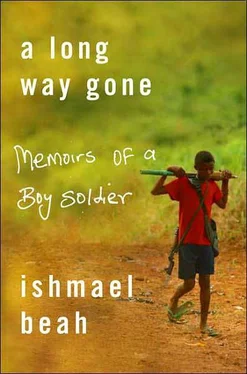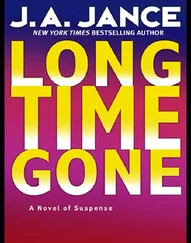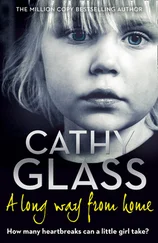THE ATTACK HAPPENEDunexpectedly one night. There hadn’t even been any rumors that the rebels were as close as fifty miles from Kamator. They just walked into the village from out of nowhere.
It was about 8:00 p.m., when people were performing the last prayer of the day. The imam was oblivious to what was going on until it was too late. He stood in front of everyone, facing east, vigorously reciting a long sura, and once prayer had started, no one was allowed to say anything that was not related to the performance of the prayer. I didn’t go to the mosque that night, but Kaloko did. He said that upon realizing that the rebels were in the village, everyone quickly and silently left the mosque, one at a time, leaving the imam by himself as he stood there leading the prayer. Some people tried to whisper to him, but he ignored them. The rebels captured him and demanded to know what parts of the forest people were hiding in, but the imam refused to tell them. They bound his hands and feet with wire, tied him to an iron post, and set fire to his body. They didn’t burn him completely, but the fire killed him. His semi-burnt remains were left in the village square. Kaloko said he saw this from the nearby bush where he hid.
During the attack, Junior was in the verandah room where all five of us slept. I was outside, sitting on the steps. I had no time to go look for him, since the attack was sudden, but instead had to run into the bush alone. That night I slept by myself, leaning on a tree. In the morning I found Kaloko, and together we returned to the village. The semi-burnt body of the imam, as Kaloko had described it, was there in the village square. I could see the pain he had felt by looking at the way his teeth were bared. All the houses were burned. There wasn’t a sign of life anywhere. We looked in the thick forest for Junior and our friends, but they weren’t anywhere to be found. We stumbled across a family we knew and they let us hide with them in the bush by the swamp. We stayed with them for two weeks, two weeks that felt like months. Each day went by very slowly as I busied myself thinking about what other possibilities lay ahead. Was there an end to this madness, and was there any future for me beyond the bushes? I thought about Junior, Gibrilla, Talloi, and Khalilou. Had they been able to escape the attack? I was losing everyone, my family, my friends. I remembered when my family moved to Mogbwemo. My father held a ceremony to bless our new home. He invited our new neighbors, and my father stood up during the ceremony and said, “I pray to the gods and ancestors that my family will always be together.” He looked at us, my mother held my little brother, and Junior and I stood next to each other with toffee in our mouths.
One of the elders stood up and added to what my father had said: “I pray to the gods and ancestors that your family will always be together, even when one of you crosses into the spirit world. To family and community.” The old man raised his open hands in the air. My father came over and stood by my mother and motioned for Junior and me to come closer. We did, and my father put his arms around us. The gathering clapped and a photographer took a few snapshots.
I pressed my fingers on my eyelids to hold back my tears and wished that I could have my family together again.
Once every three days we visited Kamator to see if people had returned, but each visit was in vain, as there wasn’t a sign of a living thing. The silence in the village was too scary. I was scared when the wind blew, shaking the thatched roofs, and I felt as if I were out of my body wandering somewhere. There weren’t footprints of any kind. Not even a lizard dared to crawl through the village. The birds and crickets didn’t sing. I could hear my footsteps louder than my heartbeat. During these visits, we brought with us brooms so that we could sweep away our footprints as we went back to our hiding place to avoid being followed. The last time Kaloko and I visited the village, dogs were feasting on the burnt remains of the imam. One dog had his arm and the other his leg. Above, vultures circled, preparing to descend on the body as well.
I became frustrated with living in fear. I felt as if I was always waiting for death to come to me, so I decided to go somewhere where at least there was some peace. Kaloko was afraid to leave. He thought that by leaving the bush we would be walking toward death. He decided to stay in the swamp.
I had nothing to carry, so I filled my pockets with oranges, tied the laces of my tattered crapes , and I was ready to go. I said goodbye to everyone and headed west. As soon as I left the hiding area and was on the path, I felt as if I was being wrapped in a blanket of sorrow. It came over me instantly. I started to cry. I didn’t know why. Maybe it was because I was afraid of what might lie ahead. I sat on the side of the path for a while until my tears were gone, and then moved on.
I walked all day and didn’t run into a single person on the path or in the villages that I passed through. There were no footprints to be seen, and the only sounds I heard were those of my breathing and my footsteps.
For five days, I walked from dawn to dusk, never coming in contact with any human being. At night I slept in abandoned villages. Every morning I made my own fate by deciding which way I was going to go. My goal was to avoid walking in the direction from where I had come. I ran out of oranges on the first day, but I collected more at every village that I slept in. Sometimes I would come across cassava farms. I would uproot some and eat them raw. The other food that was available in most villages was coconut. I didn’t know how to climb a coconut tree. I had tried, but it was just impossible, until one day when I was very hungry and thirsty. I arrived at a village where there was nothing to eat except for the coconuts that sloppily hung from the trees, as if teasing me, daring me to pluck them. It is difficult to explain how it happened, but I mounted the coconut tree quite fast and unexpectedly. By the time I realized what I was doing and thought about my inexperience in this particular art, I was already at the top of the branches and plucking coconuts. I climbed down just as quickly and looked around for something to crack them with. Luckily, I found an old machete and got to work on the coconut shells. After I was done snacking, I found myself a hammock and rested for a while.
I got up well rested and thought, I think I have enough energy now to climb and pick more coconuts for the road. But it was impossible. I couldn’t even climb past the middle of the trunk. I tried again and again, but each attempt was more pitiful than the last. I hadn’t laughed for a long time, but this made me laugh uncontrollably. I could have written a science paper on the experience.
On the sixth day, I came in contact with humans. I had just left the village that I slept in the previous night and was on my way to look for another one when I heard voices ahead of me, rising and fading as the wind changed direction. I got off the path and walked carefully, minding my footstep on dried leaves in the forest to avoid making any sound. I stood behind the bushes, watching the people I had heard. There were eight of them down at the river, four young boys about twelve years old—my age—two girls, a man, and a woman. They were swimming. After observing for a while and determining that they were harmless, I decided to go down to the river for a swim as well. In order to avoid scaring them, I walked back to the path and headed toward them.
The man was the first to see me. “Kushe-oo. How de body, sir?” I greeted him. His eyes searched my smiling face. He didn’t say anything and I thought maybe he didn’t speak Krio. So I said hello in Mende, my tribal language.
Читать дальше












